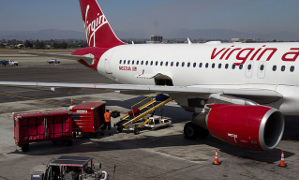 E-cigarettes could soon join flammable liquids and gas canisters on “dangerous goods” signs at airline check-ins as countries move to ban the devices from baggage destined for the airplane’s hold.
E-cigarettes could soon join flammable liquids and gas canisters on “dangerous goods” signs at airline check-ins as countries move to ban the devices from baggage destined for the airplane’s hold.
The International Civil Aviation Organization (ICAO) has amended its 2015-2016 Technical Instruction for the Safe Transport of Dangerous Goods By Air to prohibit passengers and crew from carrying e-cigarettes and other battery-powered portable electronic smoking devices in checked baggage, and from charging them in aircraft cabins.
The ICAO is a UN agency that establishes international standards and recommended practices for air travel. Although not legally binding, these standards are used as references by 191 member states when developing legally-enforceable domestic regulations.
It is widely expected that the 191 countries that follow ICAO guidance will quickly amend their own regulations to reflect the new ban on e-cigs in cargo holds. Passengers will still be able to carry e-cigarettes in cabin baggage, and rules on usage will continue to be down to individual airlines.
“Several incidents have been reported involving e-cigarette heating elements being accidentally activated and resulting in fires in checked baggage,” said ICAO council president Olumuyiwa Benard Aliu.
“We had already recommended that our member states take actions on these concerns late last year but, after a further review by our Dangerous Goods Panel, it was determined that a formal amendment to the ICAO Technical Instructions should also be undertaken.”
ICAO first issued advice on e-cigarettes in December of 2014, recommending that airlines require passengers to carry devices in the cabin rather than in checked baggage, so that incidents could be immediately dealt with.
The U.S. Federal Aviation Administration (FAA) issued a safety notice in January 2015 advising American companies to prohibit e-cigarettes from being checked into the hold after two e-cigs started fires on planes at U.S. airports.
What This Means: As a safety precaution in an industry already replete with them, rather than an attempt to suppress vaping, the ICAO instruction should not get anyone’s back up. And, given that the FAA has already issued advice along the lines of the ICAO’s original recommendation, formal regulation prohibiting checking-in e-cigs is likely to follow quite quickly in the U.S. and other ICAO member states.
– Freddie Dawson ECigIntelligence staff
Photo: Atomic Taco







